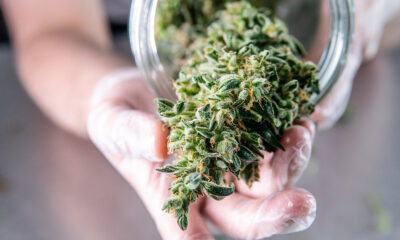
Politics
DEA Chief Quits in Protest of Trump. Who Will Replace Him?
Trump’s disregard for the law is too flagrant — even for the DEA. We speculate on who Trump could pick as his next top drug cop.
Tuesday’s announcement that DEA Acting Administrator Chuck Rosenberg would quit his post by Friday — and all because of Donald Trump, who, the drug cop says, has “little respect” for civil rights and the rule of law — was notable for its abruptness and for its candor.
But the biggest question now is who Trump will select to replace him — and what they think about the country’s widening experiment with marijuana legalization, and whether they’ll share the view of Attorney General Jeff Sessions that allowing adults to use cannabis legally is an affront to western values. (Spoiler: Probably!)
Rosenberg, appointed to the post on an interim basis in May 2015 to replace scandal-plagued Michele Leonhart, told DEA staff that his last day would be Oct. 1.
There was no immediate reaction from the White House, either to Rosenberg’s scathing assessment of the president or any indication on who Trump would select to replace him, though there was some blind praise from Trump fans.
The Obama holdover DEA Administrator Chuck Rosenberg has just announced he is resigning. DRAIN THE SWAMP! #MakeAmericaGreatAgain
— The Trump Train (@The_Trump_Train) September 26, 2017
There’s nothing to guarantee that Trump will do anything right away. Nine months into Trump’s first term, numerous key positions around the federal government remain unfulfilled, notably in the State Department. Other vital jobs have gone to Trump associates — including donors and campaign hacks.
Rosenberg is close to former FBI director James Comey. Rosenberg twice served as a chief of staff to Comey, whom Trump fired in May in the midst of the FBI’s probe into the Trump organization’s ties with Russia. So you can count out anyone close to current DEA leadership — and anyone who’s ever mentioned the words “Trump” or “Russia” too close together.
You can also count out anyone remotely progressive on drug policy.
In addition to dismissing Comey — after allegedly pressuring him to lay off the Russia investigation, a possible instance of obstruction of government — the president and his appointees have pushed back on scrutiny of law-enforcement practices and limits on what police can do.
In July, Trump told law-enforcement officers, “Please don’t be too nice” to criminal suspects. In an internal email sent to all DEA employees, Rosenberg hit back. “We must earn and keep the public trust and continue to hold ourselves to the very highest standards,” he wrote, according to the New York Times. “Ours is an honorable profession and, so, we will always act honorably.”
Under Trump, progress made in the wake of highly-publicized fatal shootings of unarmed black men at the hands of police could be undone. In April, Sessions announced that several overhauls of local police departments, including Baltimore’s, would be reviewed, delayed and possibly canceled, and that further federal investigations of big-city police forces may be suspended.
Trump has indicated his opposition to modest controls on property police are able to seize from citizens not convicted of a crime — asset-forfeiture reform — and Sessions has urged federal law-enforcement to pursue crimes that can be most easily and quickly prosecuted, which includes nonviolent drug offenses.
Already, American police arrest more people for drugs than any other crime. In 2016, drug arrests increased by almost 6 percent across the country. While detailed drug-by-drug data is not available for 2016, 43 percent of all drug arrests in 2015 were for marijuana.
Trump has been erratic on drug policy. A planned move by the White House to gut the position of drug czar and the Office of National Drug Control Policy was abandoned. Instead, to lead the organization, Trump appointed Pennsylvania U.S. Rep. Tom Marino, an early Trump supporter (like Sessions) and avowed opponent of marijuana legalization (same). And like Health Secretary Tom Price, Marino is also a favorite of the pharmaceutical industry, which has rewarded him with campaign cash for pushing policies that may have contributed to the opiate crisis.
It’s unclear how heavily Trump will lean on Sessions to suggest a replacement for Rosenberg, who as DEA chief will answer to the attorney general. Trump and Sessions have been on the outs over the past few months. Trump has publicly berated his attorney general, who called the “Apprentice”-level browbeating “one of the most humiliating” moments of his political career, and several times indicated that he wanted his attorney general to quit. Sessions has tried to quit at least once, but aides convinced Trump to ultimately refuse his resignation, the New York Times reported.
There are a few Trump loyalists who might be in need of work. There are reality stars with vague roles in the Trump White House. There are Trump loyalists still without political plums, like former New York mayor Rudy Giuliani. There are Freedom Caucus congressmen, there are Russia apologists, there are Wall Street friends.
There’s also the possibility Trump could ask new friends Chuck (Schumer) and Nancy (Pelosi) who they want as a DEA head.
Plus, there are also would-be Trump confidantes, who claim (despite all outward appearances) that they have the president’s ear, who are marijuana-friendly.
Who knows? You can almost guarantee Donald Trump certainly doesn’t.
TELL US, what should the president look for in the next DEA administrator?


























